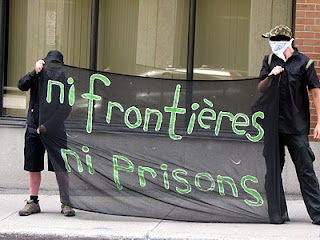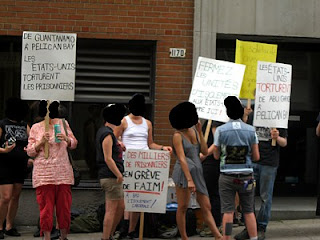
Quand: 16 juillet, 13h
Où: Carré Dorchester, coin Peel et René Lévesque (métro Peel)
Le Canada suit des politiques de crime et châtiment semblables à celles des États-Unis, le pays ayant le plus haut taux d'emprisonnement au monde et où plus de deux millions de personnes vivent en prison. Près de cent mille d'entre eux sont en isolement.
Alors que des milliers de nouvelles cages se construisent pour accommoder une augmentation massive du nombre de prisonniers, entre 2005 et 2012, le budget du Service Correctionnel du Canada (SCC) aura doublé. À la recherche des « meilleurs » moyens de garder de plus en plus de gens derrière les barreaux, des responsables du SCC ont visité des prisons « supermax » aux États-Unis, semblables à la Prison d'État de Pelican Bay où des prisonniers sont en grève de la faim depuis le 1er juillet.
Au Canada, les autochtones et les personnes de couleur sont détenus en plus grande proportion que leur nombre et ces tendances ne vont aller qu'en empirant vu le nouveau projet de loi sur le crime du gouvernement. Alors que les Premières Nations, les communautés opprimées et les gens pauvres sont ciblés par cette attaque de la classe dirigeante, d'autres vont tenter de faire de l'argent facile avec cette nouvelle expansion du système carcéral. Des architectes, des ingénieurs, des entreprises de construction (sans parler des gardiens de prison eux-mêmes) vont tous profiter des milliers de nouveaux détenus.
En même temps, au sud de la frontière, de nombreux prisonniers en Californie sont en grève de la faim depuis le 1er juillet. Pendant des années ces hommes ont été détenus dans leurs cellules, seuls, durant 22 heures et demie à 24 heures par jour, avec de la nourriture malsaine et des punitions collectives en réponse à des actions d'individus. De plus, ils se voient régulièrement (et sans raison) refuser l'accès à des programmes et avantages qui sont considérés comme la norme dans plusieurs établissements dans d'autres États et au niveau fédéral.
C'est pourquoi les grévistes de la faim mettent leurs vies en jeu. Comme l'a dit Mutope DuGuya, prisonnier à Pelican Bay: « Personne ne veut mourir. Mais dans le présent système qui équivaut à de la torture intense, quel autre choix avons-nous? Si nous devons mourir, ce sera sur nos propres termes. »
En solidarité avec les grévistes de la faim de Californie et pour exprimer notre rage, nous vous demandons de vous joindre à nous le 16 juillet pour manifester dans les rues de Montréal. Nous irons visiter des compagnies impliquées dans l'emprisonnement d'humains ici.
Pour en savoir plus sur cela ou sur d'autres activités à Montréal sur la grève de la faim des prisonniers de Californie:
Hungerstrike Support Committee / Comité d’appui avec la grève de la faim
Internet: contrelesprisons.blogspot.com
Téléphone: 514-570-6256
Courriel: montrealcontreprisons@gmail.com








